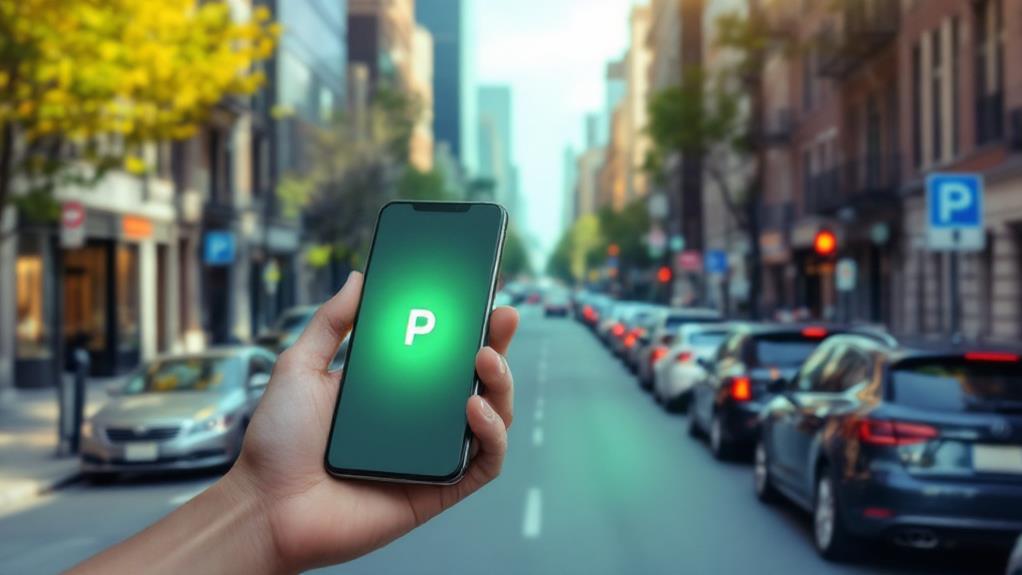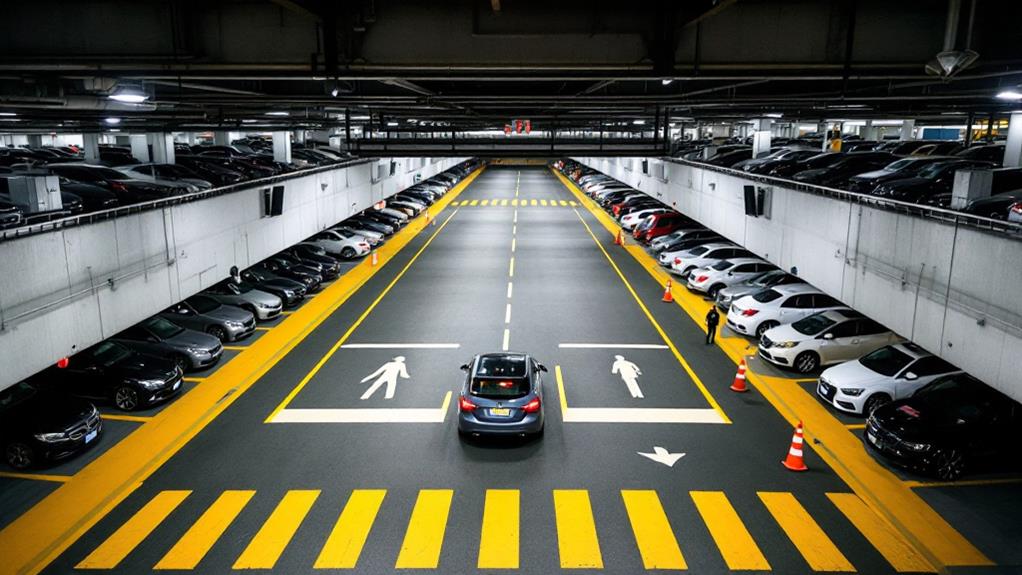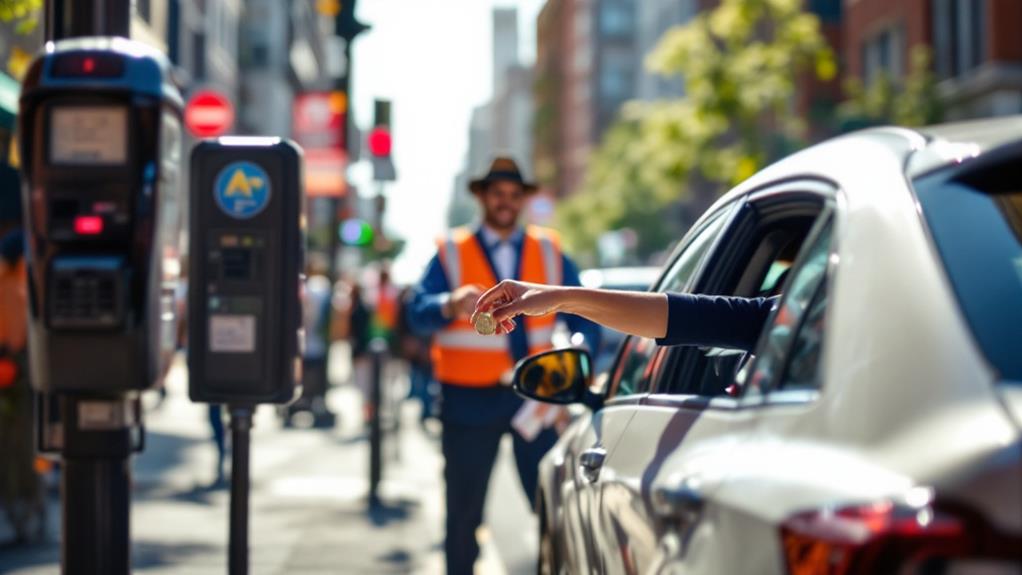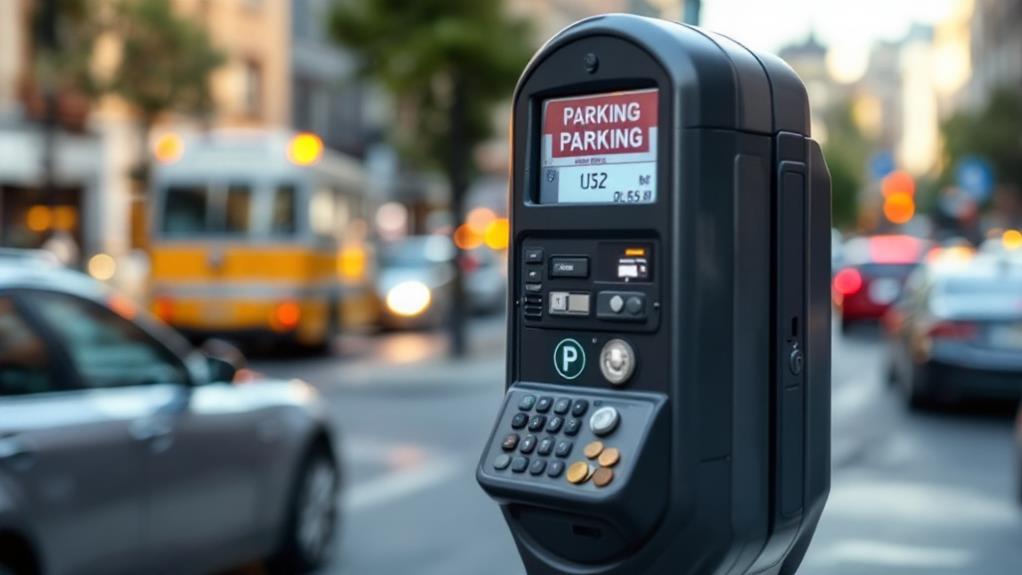Why Carpooling and Ridesharing Can Help You Avoid City Parking Woes

Carpooling and ridesharing can dramatically reduce your city parking headaches. By sharing rides, you'll avoid the stress of hunting for scarce parking spots and save money on fees and fines. You'll contribute to less traffic congestion, as fewer cars on the road mean more available spaces. Shared commuting also cuts your transportation costs, splitting expenses like fuel and tolls. You'll enjoy a more relaxed voyage, potentially using HOV lanes for faster travel times. Plus, you'll shrink your carbon footprint by reducing emissions. These benefits are just the tip of the iceberg when it comes to solving urban parking woes through shared transportation.
The Urban Parking Challenge
The city's parking predicament is a headache for urban drivers. You're probably all too familiar with the frustration of circling blocks endlessly, searching for that elusive parking space. In major cities, you'll spend an average of 17 hours per year just looking for a spot to park your car. This isn't just a waste of your time; it's also burning fuel and adding to traffic congestion.
The scarcity of parking spaces leads to a host of problems. You might find yourself tempted to double park or park illegally, risking fines and further complicating traffic flow. Even if you secure a legal spot, the cost can be a significant drain on your wallet. On-street parking is often oversubscribed, with long waitlists for residential permits and limited availability for visitors.
To avoid these parking woes, consider alternative commute options. Public transportation can eliminate the need for parking altogether. If you must drive, look into joining a carpool program. Carpooling not only reduces the number of vehicles competing for parking spaces but also allows you to take advantage of HOV lanes, potentially shortening your commute time.
Benefits of Shared Commuting
In light of the urban parking challenges, shared commuting emerges as a smart solution with numerous benefits. By carpooling, you'll not only save money on fuel, tolls, and parking fees but also reduce the stress of finding elusive parking spots in congested city centers. Your daily routine becomes more manageable as you share driving responsibilities, allowing you to relax or catch up on work during non-driving days.
The environmental impact of carpooling is significant. You'll contribute to reducing traffic congestion, which in turn lowers pollution and carbon dioxide emissions. This collective effort helps create cleaner, more livable urban spaces. Additionally, you'll benefit from shared vehicle maintenance costs, spreading the financial burden of car ownership among fellow commuters.
In some regions, you can take advantage of special carpool lanes, further enhancing your commute efficiency. These dedicated lanes often bypass heavy traffic, saving you precious time. By embracing shared commuting, you're not just solving your parking woes; you're actively participating in a more sustainable and cost-effective transportation solution that benefits both you and your community.
Reducing Traffic Congestion
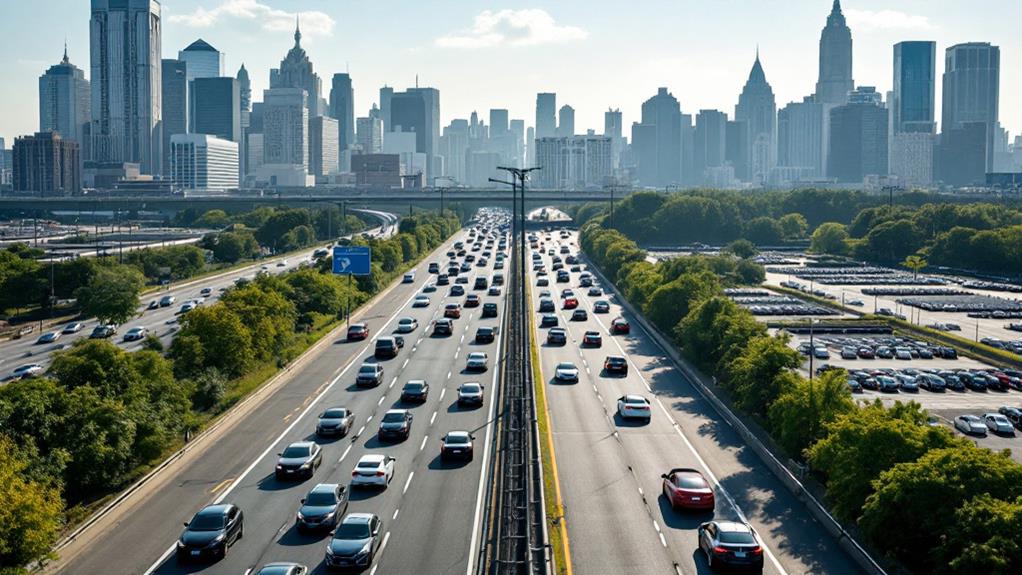
Five key strategies emerge when tackling urban traffic congestion, with carpooling standing out as a powerful solution. When you choose to carpool or rideshare, you're actively contributing to reducing the number of vehicles on the road. This simple act can have a substantial impact on alleviating traffic congestion in cities.
Studies have shown that implementing active carpooling programs can lead to impressive results, with some cities experiencing up to a 20% reduction in traffic volumes during peak hours. By increasing car occupancy, you're helping to free up road space and improve overall traffic flow. This can translate into shorter commute times for everyone on the road.
Carpooling also encourages the use of high-occupancy vehicle (HOV) lanes, further optimizing road utilization and reducing congestion. When combined with other transportation demand management strategies, carpooling initiatives can markedly curb urban traffic challenges.
Cost Savings for Commuters
Money talks, and when it comes to carpooling, it speaks volumes about cost savings for commuters. By sharing rides, you'll dramatically reduce your expenses on fuel, tolls, and parking fees. These savings can add up to hundreds or even thousands of dollars annually, making carpooling an attractive option for budget-conscious commuters.
Ridesharing services often offer discounted rates for pools, further lowering your individual trip costs. Plus, carpooling grants you access to high-occupancy vehicle (HOV) lanes, potentially reducing your commute time and fuel consumption. As fuel prices and parking fees continue to rise in urban areas, carpooling becomes an increasingly appealing alternative to driving alone.
Split costs of fuel, tolls, and parking
Save on vehicle ownership and operation expenses
Enjoy discounted rates on ridesharing services
Access HOV lanes for faster commutes
Reduce overall transportation costs
Environmental Impact of Carpooling
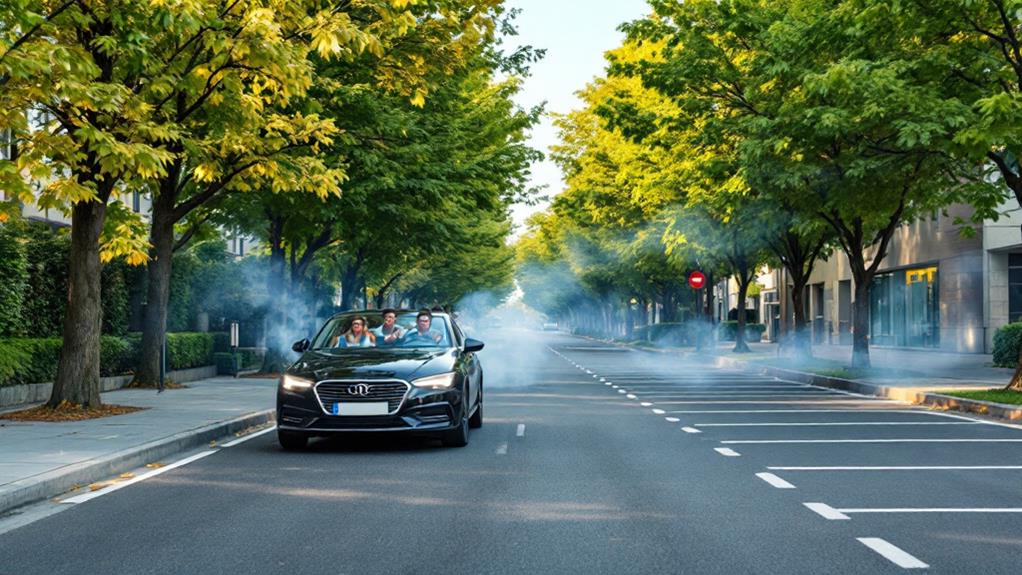
Sustainability takes center stage when discussing the environmental impact of carpooling. When you share a ride with someone else, you're actively contributing to a greener planet. By reducing the number of vehicles on the road, carpooling markedly cuts greenhouse gas emissions. In fact, a single carpooling trip can save up to 20 pounds of carbon dioxide emissions compared to driving alone.
The benefits of carpooling extend far beyond individual trips. If widely adopted, carpooling could lead to a 10-15% reduction in total vehicle miles traveled in urban areas. This translates to a massive decrease in carbon footprint. Carpooling programs have the potential to eliminate over 1 million metric tons of carbon dioxide annually, making a considerable impact on air quality and climate change mitigation.
Moreover, carpooling is an efficient way to conserve fuel resources. Studies show that sharing rides can reduce fuel consumption by 20-30% compared to solo driving. By choosing to carpool, you're not only saving money but also preserving crucial natural resources. Your decision to share a ride contributes to a more sustainable future for our cities and the planet as a whole.
Technology-Driven Ridesharing Solutions
While carpooling offers significant environmental benefits, technology has taken shared transportation to new heights. Ridesharing platforms like Uber and Lyft have revolutionized how you move around the city every day. These apps connect you with nearby drivers, eliminating the need to search for parking or guide through unfamiliar streets.
But that's just the beginning. Technology-driven solutions are constantly progressing to make your urban travels even more convenient:
- Carpooling apps like Waze Carpool and BlaBlaCar help you find fellow commuters to share rides
- Autonomous vehicle technology promises future ridesharing options that could further enhance city transportation
- Integrated multimodal transit apps combine ridesharing with public transit for seamless door-to-door mobility
- Data-driven understandings from these platforms help city planners improve infrastructure and traffic management
- Real-time updates and route optimization guarantee you reach your destination efficiently.
Carpool Lanes and Incentives
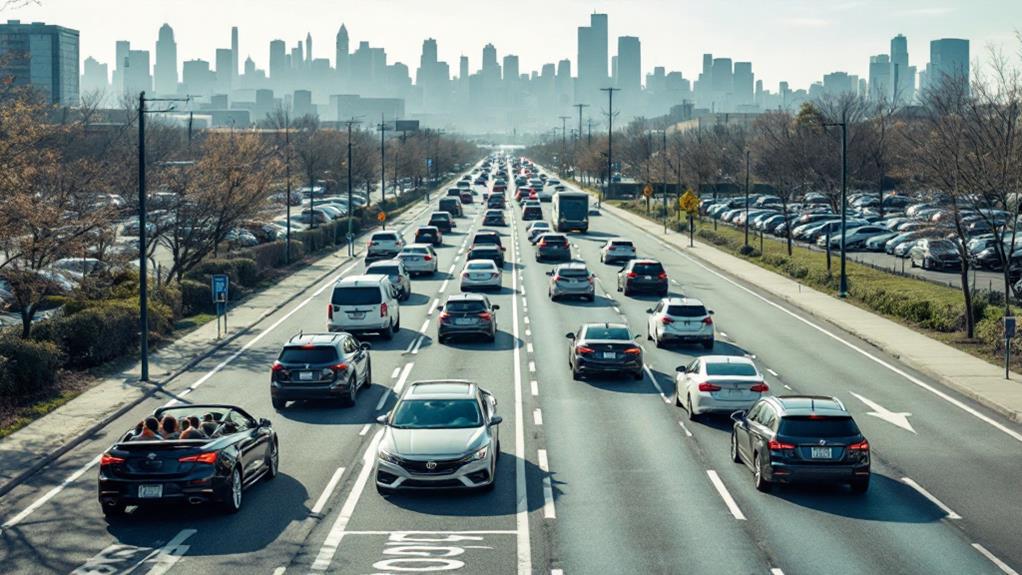
For decades, cities have implemented carpool lanes and incentives to encourage shared commuting. These strategies have proven effective, with research showing that carpool lanes and incentives can amplify carpooling participation by up to 50%. If you're looking to avoid parking hassles and save time on your commute, carpooling might be your solution.
Many cities offer high-occupancy vehicle (HOV) lanes, which provide faster travel times for vehicles with two or more passengers. In the San Francisco Bay Area, for example, carpools and vanpools make up over 25% of vehicle trips during peak hours on highways with HOV lanes. You could save significant time by joining the carpool crowd - a study in Washington D.C. found that carpoolers saved an average of 15-20 minutes on their commute compared to solo drivers.
Beyond time savings, you might also benefit from financial incentives. Governments and employers often offer perks like discounted parking or reduced tolls for carpoolers. So next time you're heading to work and notice everyone's going in the same direction, consider starting a carpool. You'll save time, money, and contribute to reducing traffic congestion.
Building Community Through Carpooling
Beyond the practical benefits of saving time and money, carpooling offers a unique opportunity to build community. As you share rides with colleagues or neighbors, you'll find yourself cultivating new social connections and engaging in meaningful interactions during your daily commute. This collaborative approach to transportation can strengthen the social fabric of your neighborhood and workplace.
By participating in carpooling programs, you'll:
- Form friendships with fellow commuters
- Exchange ideas and viewpoints during your journey
- Develop camaraderie with colleagues or classmates
- Support local community initiatives
- Contribute to a shared goal of reducing traffic and emissions
Carpooling serves as a platform for community-building activities, allowing you to organize social events or volunteer for sustainable transportation causes. You'll find yourself part of a growing network of like-minded individuals who value both efficiency and social connection.
As you engage in community-based carpooling initiatives, you'll actively support and interact with your neighbors, creating a stronger sense of belonging. This collaborative spirit extends beyond the commute, potentially leading to lasting friendships and a more cohesive local community.
Overcoming Carpooling Barriers
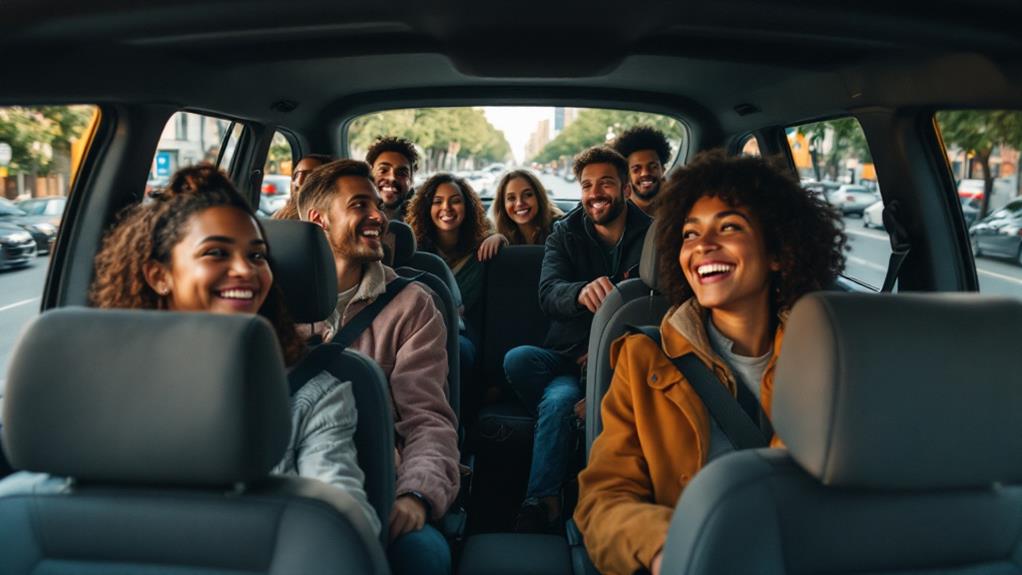
Tackling the barriers to carpooling requires a complex, multilayered approach. To overcome these obstacles, it's imperative to address the stigma and misconceptions surrounding this practice. You'll need to rationalize your perception of carpooling safety by objectively evaluating the risks rather than relying on sensationalized media depictions.
Shifting mindsets is pivotal for normalizing carpooling on campus. Recognize that carpooling isn't just about transportation; it's an opportunity to form new friendships and build a stronger community. By reducing irrational paranoia about riding with strangers, you'll open yourself up to a more efficient and social commuting experience.
To make carpooling work for you, consider utilizing apartment complex resources or student-run websites that can help match you with compatible ride partners. These platforms can accommodate varying schedules and class attendance patterns, ensuring flexibility and convenience.
Future of Urban Transportation
As we look toward the future of urban transportation, a revolutionary shift is on the horizon. You'll soon see a transformation in how you move around cities, with ridesharing and autonomous vehicles taking center stage. Urban planning will focus on integrating these new mobility options into existing networks, reducing the need for private car ownership and easing parking woes.
You'll benefit from:
- Seamless multimodal expeditions using mobility-as-a-service platforms
- Reduced traffic congestion through smart city technologies
- Better-managed parking and curb access
- Improved access to shared mobility options
- Enhanced vehicle-to-infrastructure communication
Cities are collaborating with transit agencies, rideshare providers, and tech companies to create more efficient and equitable transportation systems. You'll experience smoother traffic flows and easier access to various transport modes. As urban planners implement these changes, you'll find it increasingly convenient to rely on shared mobility options rather than your own vehicle.
The future of urban transportation is all about connectivity and flexibility. You'll have more choices for getting around, with technology making it easier to plan, book, and pay for your excursions. This shift will not only simplify your daily commute but also contribute to more sustainable and livable cities.
